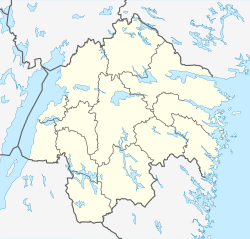Linkoping
| Linköping | |
|---|---|

Central square in Linköping
|
|
| Motto: Linköping – where ideas come to life | |
| Coordinates: 58°24′57″N 15°37′31″E / 58.41583°N 15.62528°ECoordinates: 58°24′57″N 15°37′31″E / 58.41583°N 15.62528°E | |
| Country | Sweden |
| Province | Östergötland |
| County | Östergötland County |
| Municipality | Linköping Municipality |
| Founded | 12th century |
| Area | |
| • City | 42.16 km2 (16.28 sq mi) |
| Elevation | 45 m (148 ft) |
| Population (31 December 2010) | |
| • City | 104,232 |
| • Density | 2,500/km2 (6,400/sq mi) |
| • Metro | 140,367 |
| Time zone | CET (UTC+1) |
| • Summer (DST) | CEST (UTC+2) |
| Postal code | 58x xx |
| Area code(s) | (+46) 13 |
| Website | www |
Linköping [ˈlɪnːˌɕøːpɪŋ] is a city in southern Sweden, with 104,232 inhabitants in 2010. It is the seat of Linköping Municipality and the capital of Östergötland County. Linköping is also the episcopal see of the Diocese of Linköping (Church of Sweden) and is well known for its cathedral. Linköping is the center of an old cultural region and celebrated its 700th anniversary in 1987. Dominating the city's skyline from afar is the steeple of the cathedral.
Nowadays Linköping is known for its university and its high-technology industry. Linköping wants to create a sustainable development of the city and therefore plans to become a carbon neutral community by 2025. Located on the Östergötland Plain, Linköping is closely linked to Norrköping roughly 40 kilometres (25 mi) to the east near the sea.
The city is possibly named after the Lionga ting assembly which according to Medieval Scandinavian laws was the most important thing in Östergötland. Exact location of the Lionga ting is not known, but it was along the Eriksgata. Köping means there was a market there.
Historically, Linköping is famed for being an early diocese, second in Sweden (within its pre-1658 boundaries) only to Skara. The diocese is first mentioned in 1104 in the so-called "List of Florence" (Lionga. Kaupinga). The monastery of Vreta Kloster near Roxen north of Linköping was established in 1128, and the oldest parts of the cathedral are also from the 12th century (although it has been changed many times since then, the eye-catching tower with copper roofing being a 19th-century product). On several occasions attempts to achieve a separate Swedish archdiocese were based in Linköping, although, when they finally were successful in 1164, Uppsala was chosen instead.
...
Wikipedia


